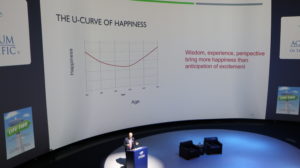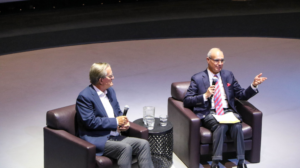It’s always interesting to find out what others get from my research!
Before I start this piece, I’m happy to say that Podcast Episode #5 has been uploaded. It’s “Stage 3: Get Set,” and our guest is Ernie Zelinski, international best-selling author. This is about getting ready to retire. Personally, I seek direct principles to follow, but most people don’t: they learn the principles themselves, from personal experiences or stories about others. That’s a much better way to understand the principles than being told them by me. Ernie is the most brilliant teller of stories I’ve ever come across – that’s a skill I would use, if I had it. All the more reason to tune in to Ernie.
***
Recently a couple of my activities went on the record, and I’ll include hyperlinks to them in this blog post.
The more recent event is a podcast in which I was interviewed (https://www.retirementwisdom.com/freedom-to-retire-don-ezra/). Retirement Wisdom is a website that focuses on the non-financial aspects of retirement, so naturally I was intrigued (and flattered) when I was invited to take part in a podcast related to my book Life Two. Their life coaches also help with financial aspects, and I was impressed with what I saw on their website. The questions they suggested discussing clearly revealed that they had read and liked Life Two. So I agreed.
Joe Casey and Denis Wuestman did the interview, and it was a very happy experience for me. The hyperlink above enables you to listen to it: roughly 25 minutes with me, and 5 minutes after that in which they reflect on what they got from the interview.
It’s that last angle that interests me.
In our podcasts Alex Mazer and I interview experts, and then I do my Personal Touch at the end, picking out angles that should help listeners to improve their lives today. It never occurred to me (I tend to have a very narrow focus!) that our experts might wonder if I’ve interpreted them accurately, or if the aspects that are most important to them also come through as most important to me. Now that the shoe is on the other foot, suddenly I’m aware that we all see the world through our own lens, and each person’s lens is different!
(I hope that I’ve interpreted them accurately. Certainly all of them have been not only experts, but also excellent communicators. So I’ll take this opportunity to apologize to them if I’ve misrepresented them in any way.)
As it happens, I needn’t have worried about Joe and Denis. They not only did their homework, they also wrote a very generous page about the podcast on the website, and I loved their 5-minute summary (which includes an excellent and amusing idea about Venn diagrams!)
And if you download their free ebook (https://retirementwisdom.lpages.co/ebook/ ) 7 Traps in Planning for Life in Retirement: and how you can avoid them, you’ll see how much our thinking has in common.
The other activity of mine is one I mentioned in Post #95 on Volunteering. I said there that I had conducted a session in October last year at the Fall 2019 Aquatic Academy in Long Beach, CA. The Aquatic Academy offers two courses each year at the Aquarium of the Pacific in Long Beach. Its Fall 2019 theme was “Longevity: Changing the Narrative.” My friend and mentor Russ Hill (his firm Halbert Hargrove Global Advisors made the arrangements) pulled together four speakers, three from Stanford University and me (holding up the British end as a graduate of Trinity College, Cambridge!), each of us having written and spoken extensively on aspects of life and retirement and longevity. In fact you’ll see, from the attached report Longevity- Changing the Narrative that we’ve each written a book relevant to the topic.
The sessions took place on successive Thursday evenings in October, and mine was thoroughly enjoyable. It started with dinner and excellent conversation with the Academy and Halbert Hargrove hosts, followed by a roughly one-hour session that included questions and answers in a very stimulating interaction with the audience, each of whom had been given a copy of Life Two.
(Here are a couple of photographs from the event. You’ll see from the first that their auditorium stage and backdrop were huge, and that I knew that the U-curve of happiness would be a popular thing to mention. The second was taken during the Q&A, and that’s Russ chairing the session as I respond to a question.)


The other three sessions were conducted by superb experts: Dr Laura Carstensen, Steve Vernon and Bill Burnett, and I was honored to be a speaker along with them.
Recently Russ sent me a write-up of the four sessions, and that’s the report mentioned above. I recommend it highly – I have no doubt you’ll enjoy it and learn a lot from it. Certainly I learnt a lot from it, as Laura, Steve and Bill all come at it from perspectives that are different from mine.
Laura spoke not only about increasing longevity, but also about tapping the human capital of older people. (You’ll recall that she leads the Stanford Center on Longevity’s project on a new map of life, mentioned in my last blog post.) Steve is a Consulting Research Scholar at the Stanford Center on Longevity, and explained five elements of a strategy for a healthy, financially secure and fulfilling long life. Bill is Executive Director of the Design Program at Stanford, and I’m currently reading (and enjoying and learning from) his book Designing Your Life. I had no idea that design was such a well-defined process, and could be applied to one’s life! (I get the impression that he and I think alike on much of Life Two, but his approach helps enormously in enabling you to do the exercise I set at the end of each walk through the territory of Life Two.)
I mention all this partly for your enjoyment and ongoing education – certainly that’s my takeaway from it all.
But I also mention it in the context of the theme of this blog post: seeing what others get from my research. I had no idea what would be the reporter’s takeaways. (Indeed I didn’t know there would be a report.) And once again I’m very relieved. The reporter’s summary of my presentation gets to the big stuff extremely well, thank goodness!
In fact, there’s a lesson for me, as I see both the summary of my talk and the design principles that Bill explained in his talk and his book: I go too deep and too fast. I shouldn’t go that deep: I should keep things simpler. And I shouldn’t go so fast: I should take the time to explain, very gradually. So my writing should focus on gentler explanations of simpler aspects. Of course, that doesn’t mean that deeper, more complex aspects aren’t relevant. They are. But I should take small steps. And no doubt many readers will be happy to take just a few steps, and won’t want to go all the way to the destination I have in mind. But that should be your choice, not mine. And I should give you the option, after each step, by asking if you’d like to stop there or go further.
It won’t be easy for me to change the way my mind works, or my way of writing, after a lifetime. But I’ll try to remember these things, or else what’s the use of learning a lesson?
***
Takeaway (for me)
A journey of a thousand miles starts with a single step. Not everyone wants to travel the whole thousand miles.
***
6 Comments
I have written about retirement planning before and some of that material also relates to topics or issues that are being discussed here. Where relevant I draw on material from three sources: The Retirement Plan Solution (co-authored with Bob Collie and Matt Smith, published by John Wiley & Sons, Inc., 2009), my foreword to Someday Rich (by Timothy Noonan and Matt Smith, also published by Wiley, 2012), and my occasional column The Art of Investment in the FT Money supplement of The Financial Times, published in the UK. I am grateful to the other authors and to The Financial Times for permission to use the material here.
Hi Don, as always I enjoy your posts! And, I will plan to take advantage of some of these resources, partially for intellectual curiosity and partially because I’m planning to retire in the summer so Life 2 is getting very real for me! Just one quick reflection on your post: while I wholeheartedly believe in learning lessons and hope I can do that every day (my grandfather was my mentor there, but then that’s another story), I would be a bit careful in trying to change the way you think or the way you write. Both of those things are uniquely you and while we can all learn things that augment what we already know, we have to be careful not to throw the baby out with the bathwater. Please don’t change too much! You are known and appreciated for who you are and what you do!
Best,
Cindy
Thanks for the reassurance, Cindy. All the best as you enter Life Two!
I’m with Cindy! Most of your (and my) thinking processes are pretty hardwired by now ????.
Mike
Thanks, Mike — I’m sure you and Cindy are right. I wouldn’t — couldn’t — change my approach to learning and writing at this stage. But I have to learn to write for the uninitiated rather than for those who are already in this field. Oh for some focus groups of average DC participants, for me to learn from!
I agree with those who say you, Don, are who you are. Also, if you have been writing in a particular style and have been successful with it, I’m not sure it’s worth changing. An analogy may be Tiger Woods who, when he decided to change his swing, suffered increased losses until he mastered a new style.
What I would say, though, is that it is important to take into consideration who one’s audience is. Essentially, you acknowledged this in your blog. Indeed, you write to different audiences. Some of your work is to a well informed audience who welcome more detail and examination of subtleties. They will be more patient.
Others have different preoccupations. They want a précis of the topic. Indeed, the average adult attention span is about 20 minutes. Just as this principal applies to writing, I suspect it also applies to podcasts.
Thanks, Ted. As I look over the comments I’ve received (for which I’m very grateful), I get these two messages. (1) Don’t change my style (too difficult at this stage, anyway). (2) Remember I’m writing for two audiences, so those who want a précis should be given one, and those who want more detail and depth can get it too. OK, that’s a very useful takeaway. As far as the podcasts are concerned, we’ve recorded them already, and I’ll accept that they’re for the informed audience. Perhaps those who want a faster takeaway can go straight to Don’s Personal Touch at the end, which is around 10 minutes long and oriented towards the practical. If something there intrigues them, they can check the index and go to the part of the interview that is relevant (and of course for someone like me the entire interview is worthwhile!).